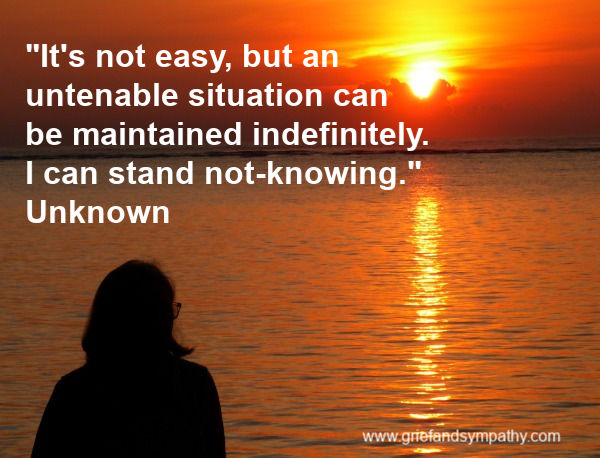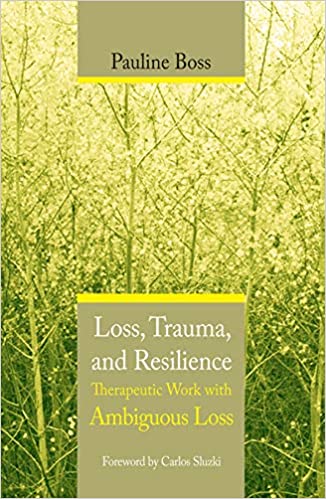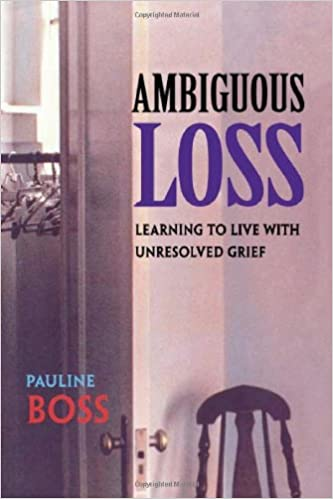6 Guidelines for Living with Grief for Missing Persons
In this article about grief for missing persons, we interview Dr Pauline Boss, author of 'Ambiguous Loss: Learning to Live with Unresolved Grief'. Dr Boss has worked with families who have lost loved ones to war, through terrorism and through mental illness. Her extensive research over 40 years of working with 'ambiguous loss', a term she coined in the 1970s, has led to a set of guidelines for therapists helping those with this type of loss. You can read the guidelines below and they may help you to understand that you can learn to live with someone missing from your life.
When someone goes missing, the stress for family and friends is overwhelming. There is shock and fear, also hope, the thought that their loved one will not return is too much to take in. Many people go missing every day, for many different reasons.
Many people go missing during wars and natural disasters such as tsunamis or earthquakes. Families become separated when trying to migrate to escape war or danger.
Accidents happen when people are out fishing, mountain climbing or deep sea diving and they never come back. Often their bodies are never found so there is no closure or certainty.
Some people go missing deliberately, either because of mental illness or perhaps because of drug addictions or domestic abuse. Sometimes it is an elderly confused person who goes for a walk and forgets the way home.
Then we come to the criminal elements of abduction or murder, too terrible to contemplate.
Some missing persons are found safe and well but for many the uncertainty about what happened to their loved one will go on for the rest of their lives.
Dr Pauline Boss has worked with families of the missing throughout her extensive career and has developed guidelines that assist in learning how to live with this uncertainty. Lesley spoke to her recently and learned much about what it is like to live without someone missing and how she teaches families to cope.
LP: I would imagine there is a lot of difference in the way loss is experienced when someone is missing through a natural disaster or something like 9/11 and it is more than likely that the person has died versus a situation where a person is missing and it is unknown whether they have died or not and that they might come back?
PB: Not really, because I think it’s human nature that if you are very attached to someone, or you love someone, and they disappear, you are never going to believe that they are dead. You might, as the soldiers’ wives did, sign a paper in order to get the insurance benefit, (and 9/11 people did that too), but they didn’t believe that they were dead. They carry that uncertainty with them perhaps forever.
LP: So even if it seems really obvious to an external observer that the person must have died, if you haven’t got the body, you really can’t believe it?
PB: In fact, as a therapist I learned that it is mean to say that to someone, because we, as observers, as therapists, we don’t know for sure if a missing person is alive or dead. It has happened that a missing person suddenly walks out of the bush or shows up again. So what do you do instead of insisting they are dead, we teach people how to live with ambiguity so there is no need for closure. To do this, we do not use grief therapy. People can get very angry if we do because they are not ready to see their loss as a death. I think they are correct in being angry about that.
A story of a missing person from Elizabeth Postle, author of this site:
"A friend had a terrible experience when her son went missing, he had a day off work and went for a jog. He simply disappeared. His wife reported him missing when she got home that evening. He was a family man and everyone retraced his jogging tracks. The police did a full investigation and no trace was found of this loving husband, son and father. Their shock and grief was mixed with hope that he would walk in the door again. But also fear that his body would be found. Each day life went on but with this huge uncertainty hanging over the family. They finally had closure two years later when a skeleton was found on the edge of bush land and his DNA was matched. They never established the cause of death."
LP:
So it’s better to hold out that hope?
PB: No, here’s what you do instead. You say, “He is probably dead, AND maybe not.” so we recommend a less absolute (or non-binary) way of thinking . “He may come back and likely not.” So both of those ideas are true. In the absence of facts, you have to use a more dialectical way of thinking. What this does is lower the stress level of those who have to live with uncertainty for the rest of their lives. You don’t want them to stop their life and wait for the missing person to come back. Rather, they have to move forward with their life. It’s easier to do that if you can hold the opposing ideas in your mind at the same time. “She’s probably dead and maybe not.”
LP: That’s really interesting. So you don’t have hope and you don’t have closure, but you learn to live in an uncertain situation?
PB: You leave it uncertain and you just accept the uncertainty.
LP: So my next question doesn’t quite work, because if I say to you: ‘what additional challenges does a griever face when dealing with unresolved loss?’ are you going to say to me that the person is not a griever?
PB: No, they are grieving and it’s a lifelong grief if the person is missing for a lifetime, and so we acknowledge that grief and we say that the culprit is the ambiguity and in the not-knowing, not in your personality. We take away the idea that there is something wrong with you because you’re not over it yet. How could you get over it if a child were kidnapped or if your parent, your brother, your loved one disappeared? You never get over it, you learn to live with it. So the way we help is to increase people’s tolerance for ambiguity. That’s not a very western idea.
LP: I like that. I’m interested in meditation and a lot of eastern ideas. I think they can be very valuable.
PB: Yes, especially when there is no solution. I’m as mastery oriented as anyone. My father was a Swiss immigrant, and, of course, with American Protestantism we are steeped in the idea that we can solve anything as long as we work hard enough. For the most part, that’s true, but now and then you come up with a problem that has no solution, like a missing person, and then you have to attack it differently.

"It's not easy, but an untenable situation can be maintained indefinitely. I can stand not-knowing."
Unknown therapist quoted on www.ambiguousloss.com
LP: So you are actually teaching people to accept living with the ambiguity, rather than accepting a loss or accepting a death?
PB: I even think that accept is too strong a word. “I choose to accept” is what I say to people is the way to think about it. “I choose to accept this” still gives them some power, some agency. You can choose to accept the ambiguity, or some people even say to me, “I’m embracing it now, because it allows me to not have to say this person is dead, when I don’t really know for sure”. They feel that would also be dishonouring the missing person. Then, they do grieve, because, yes, they have a loss, but unfortunately, the larger community, (and you as a writer can help with this) needs to know that when someone has a missing person, people should also say something to them. There are no sympathy cards for the missing, or church rituals or anything. All you would have to say is “I’m so sorry, is there anything I can do?”, and of course it can go on for years and sometimes families have anniversaries of the missing person or put a flower on a plaque for that day.
LP: Yes I suppose it is important to have some sort of ritual isn’t it?
PB: I agree. We should support those rituals.
LP: For those people that don’t get the kind of help that you are advocating, does that mean that their grief process gets frozen and unresolved and what happens to their mental health when that happens?
PB: Having this kind of loss would cause frozen grief for anyone, for you or I or anyone, because this kind of ambiguous loss is so horrendous. It has no answer. You’re stuck. So what we want to do is unfreeze it. And what I told you before that both end thinking is how you unfreeze it. You learn to have two opposing ideas in your mind at the same time. He/she is probably gone, but maybe coming back. You can live with that. And then you also learn how to move forward with your life and the coping mechanisms and so on.
The Six Guidelines for Living with Ambiguous Loss
In my second book (for professionals although anyone who is interested could learn from it), I gave six guidelines for how to live with ambiguous loss.
The six guidelines, not in any order, are what you have to deal with to make sense of, and find meaning in ambiguous loss or a missing person when you have no facts.
- Finding Meaning. This can be finding a purpose in your life, such as raising your children well, or a job, or helping others. It can be a way of honouring the person who is missing.
- Adjusting your sense of mastery
(control). Certain cultures have too much mastery and so they’re absolutely
stunned by having missing persons. I’m thinking of New York City. Very
confident, mastery oriented people. Sydney might be that way too. You may become
very anxious and have feelings of anxiousness when you can’t solve a problem so
in that case you have to lower your sense of mastery. (Let go of wanting to
control everything). Whereas in many other populations, especially patriarchal
cultures and perhaps island cultures, you have to increase your sense of
mastery.
For example, how can women in a patriarchal society whose husbands have gone missing, how can they cope because once their husband is missing, they are neither a widow nor a wife? So they have no role and are often abused and become the ‘Cinderella’ of the family. Humanitarian organizations who use my ambiguous loss model to work with families of the missing all over the world are the ones who told me that the people they help are not all like New Yorkers. They found that if they gathered these women together, these non-widows, in a group in the community, then they gain more mastery and agency, so that if someone is beating them up in their home, this whole group now knows about it. They gain strength in community. In the book I call this guideline “tempering mastery”, but it should be “adjusting mastery, either up or down.” - The third guideline is Reconstructing your Identity. As I said, some wives of missing husbands don’t know who they are now, as in their culture, they are nothing - neither wife nor widow. But for anybody who has a missing spouse, do you marry again, or are you still married? For a parent of a missing child, how do you answer when someone asks how many children you have? Do you still consider yourself a parent if your only child is missing? Read more about loss of self-identity here.
- The fourth guideline is Normalising Ambivalence. Most people who have missing persons, after a while, will say things like “I just wish I had his/her remains”, and then they feel guilty for saying that because it’s like wishing them dead. So they are between the devil and a hard place here. We suggest choosing to accept the ambivalence as normal and encourage talking with others who have missing loved ones about this.
- The next is Revising Attachment. You have to revise your attachment to the lost person. You do this in your mind, because you have no death certificate; you think both/and: that they are probably dead, but maybe not; you somehow move forward with your life with new friends and attachments. That’s what you need to try and do – to carry on with life, and even have some joy. You still remember the lost person and continue to feel attached but now, in a more symbolic or spiritual way. There is no need for closure.
- The last guideline is Discovering New Hope. It’s important to have something new to hope for. Not hope for the person to come back, but something new. Sometimes that may be working so that this kind of loss won’t happen again. If the missing person has been kidnapped you may work to prevent further kidnappings or reporting them sooner. You might work for a cause, a higher cause. Or sometimes it’s as simple as “I’m going to honour this missing person by having a good life myself, or raising our children well”.
LP: That brings you neatly back to finding meaning again doesn’t it?
PB: You’ve got it. These guidelines work as a circle for making us strong enough to live with having a missing loved one.
If you'd like to know more about the 6 Guidelines, see Dr Pauline Boss's 2006 book, 'Loss, Trauma and Resilience: Therapeutic Work with Ambiguous Loss.'
This book is primarily written for therapists, but those grieving a missing person may also find it useful.
LP: That’s really lovely. I think it’s a fantastic way of dealing with that. I think that will help a lot of people, because obviously, not everyone is going to be able to get to a psychologist or to therapy, so if we can bring your books and what you have said to those people who are searching for answers, I think it will help.
PB: Grief for missing persons is just horrid for the people left behind. They need a way to build their resilience to bear the pain.
LP: Yes, my mother had a very good friend who lost her son in the Amazon jungle. We’ll tell that story on the page too as I’m sure a lot of people will be able to relate to it. I’d like to thank you so much for talking to me and sharing your years of expertise in this area. You have opened my mind so much in just half an hour.
PB: I am very honoured to be asked and I hope our paths cross again.
If you’d like to read more about Dr Pauline Boss’s ideas about ambiguous loss and living with the uncertainty of a missing person in your life:
Related Pages
Also Read About Disenfranchised Grief
Some Beautiful Grief Definitions from Our Bereavement Experts
Where to get help:
Have You Considered One-on-One Online Grief Counseling?
Get Expert and Effective Help in the Comfort of Your Own Home
The following information about online counseling is sponsored by 'Betterhelp' but all the opinions are our own. To be upfront, we do receive a commission when you sign up with 'Betterhelp', but we have total faith in their expertise and would never recommend something we didn't completely approve.
Do you feel alone and sad with no support and no idea how to move forward? It can be tough when you are stuck in grief to find the motivation to get the most out of your precious life.
Online counseling can help by giving you that support so you don't feel so alone. You can have someone to talk to anytime you like, a kind and understanding person who will help you to find meaning in life again, to treasure the memories of your loved one without being overwhelmed and to enjoy your activities, family and friends again.
- Simply fill out the online questionnaire and you will be assigned the expert grief counselor most suitable for you. It only takes a few minutes and you don't even have to use your name.
- Pay an affordable FLAT FEE FOR UNLIMITED SESSIONS.
- Contact your counselor whenever you like by chat, messaging, video or phone.
- You can change counselor at any time if you wish.
- Click here to find out more and get started immediately.
- Or read more about how online counseling works here.
Sales from our pages result in a small commission to us which helps us to continue our work supporting the grieving.
Hypnosis for Grief - 10 Ways It Can Help You
Try a gentle hypnotherapy track to relax the mind. Learn how self-hypnosis can help you cope with grief at any time of the day or night.

- Grief and Sympathy Home
- Other Types of Grief
- Grief for Missing Persons


